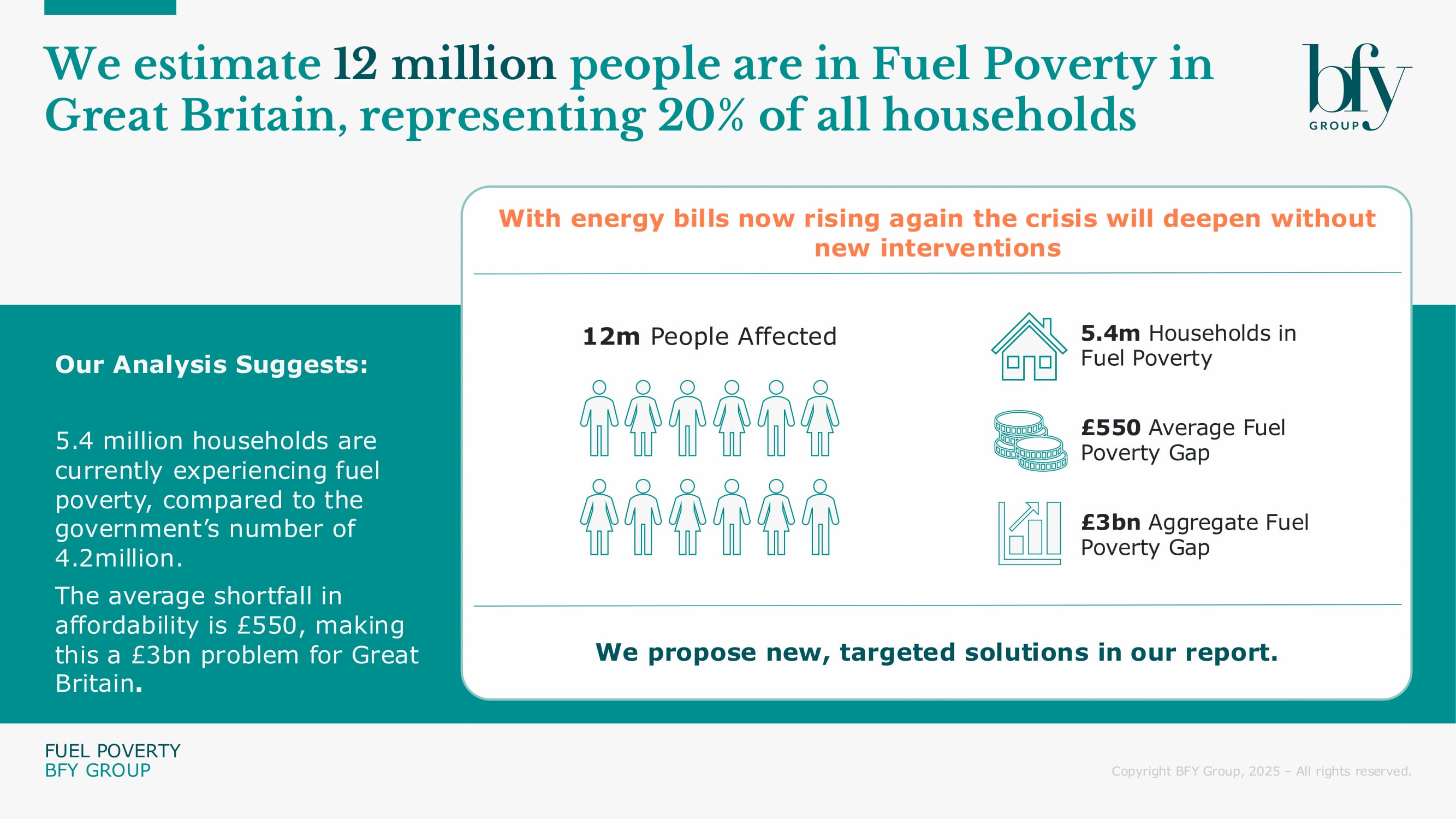The government's recent reversal on the Winter Fuel Payment marked a small, but significant, shift in approach to supporting vulnerable households.
It’s a reminder that fuel poverty remains a live issue - and that there’s still considerable ground to cover in designing support that’s both fair and effective.
In March, we published a report with So Energy to better understand the true scale of fuel poverty in Great Britain, and what it’d take to meaningfully reduce it. Our analysis, discussed in Parliament, proposed a new Warm Homes Support Scheme - a more targeted, tiered approach that could better match the level of support to the level of need. It also set out how private sector investment could help ease the burden on public funds.
In this article, we revisit the core insights from that report, look at what’s changed since, and explore what energy suppliers can do now to improve how they identify, engage and support customers who are struggling.
You can also read the key takeaways from our recent roundtable discussion on consumer vulnerability here.
Report Recap: Warm Homes Support Scheme
Failing government measures
Our report highlighted government schemes intended to address fuel poverty - such as the Warm Home Discount (WHD) and the Energy Company Obligation (ECO) - continue to fall short in both adequacy and targeting.
Based on our insights, we estimate that the current support provided by the WHD only reduces the fuel poverty rate by 200k households, despite being provided to ~3.1m.
This low impact is driven by poor targeting, as the scheme is tied to means-tested benefits, and is compounded by a relatively low one-off payment of £150 - an insufficient amount to close the average £550 fuel gap faced by many households.
Similarly, the ECO provides £1bn in support each year, supporting around 80k-100k homes with funding for energy efficiency improvement. Despite high support costs, it’s estimated that only 40k of the homes receiving help are fuel poor by our own definition, and on average the ECO only saves households £455 per year through efficiency measures. This results in just 18k homes being lifted out of fuel poverty.

Poor targeting
Poor targeting continues to undermine the effectiveness of government schemes intended to alleviate fuel poverty. The WHD, for example, is hampered by flawed eligibility criteria, resulting in up to ~4m fuel-poor households being excluded from the support they desperately need. Current eligibility is mostly based on receipt of mean-tested benefits, but this excludes millions of other low-income or high-usage households.
One of the primary challenges within the ECO is the high cost of identifying and targeting eligible households; with lead generation estimated to cost around 10-20% of the funding. Despite the schemes scale and intention, the outcome of only removing 18k households from fuel poverty highlights the disconnect between cost and impact.
Limited reach
Whilst official figures estimate 4.2m households are in fuel poverty; BFY Group’s independent analysis puts it closer to 5.4m (1 in 5 homes). Furthermore, the level of support needed varies considerably among affected households. While some may face a relatively modest shortfall, others are grappling with a fuel poverty gap exceeding £1,000, highlighting the urgent need for more targeted and substantial interventions to reach those most in need.

When staying warm is a luxury, it's time to change the system
Recent developments reflect a firmer policy shift, with the government officially reinstating Winter Fuel Payments for pensioners earning up to £35,000 - reversing the previous means-testing decision.
While not a wholesale reform, it suggests a willingness to revisit and improve how support schemes are structured - an encouraging sign for broader efforts to address fuel poverty more effectively. Additionally, the recent July Price Cap announcement sees a welcome 7% drop to ~£1720. Whilst this offers some relief, with typical households saving around £30 over 12 months, is it enough?
The Energy Security and Net Select Committee (ESNZ) continue to play a crucial role in scrutinising policies and administration, opening the ‘Cost of Energy’ enquiry earlier this year. This focuses on energy bills and how they can be reduced for both domestic and commercial consumers, the regressive impact of standing charges, and the need for energy price rebalancing.
Fuel poverty is a complex and persistent issue that goes far beyond just energy costs. It reflects a convergence of societal, economic and policy-related challenges. Suppliers have a vital role to play in supporting customers with an opportunity to connect with households, deliver support schemes and better manage bills and debt. Since our fuel poverty report and roundtable discussion, issues remain at large and require spotlight focus to drive real change, and tackle the societal issue together.
At BFY, we recognise there are some fundamental drivers all suppliers can adopt, to improve the identification, engagement and support of vulnerable customers.
1) Improve targeting of support
Using customer data, suppliers can enable a targeted and effective ‘risk recognition’ approach using customer segmentation and risk profiling. In doing so, this can ensure that the most fuel poor households receive the £150 WHD and could see the total fuel poverty gap reduce by ~£300m (as discussed in our report).
2) Provide accurate billing
Ensuring billing accuracy is critical to identifying and addressing financial vulnerability early, with potential back billing reforms underscoring the urgency of this issue. Accurate bills not only build trust but also enable suppliers to spot emerging risks before they escalate. This relies on capturing high-quality customer data, supported by well-trained frontline staff, equipped to recognise and respond to signs of financial distress effectively.
3) Innovate with energy efficiency and debt support
Offering practical support such as energy efficiency advice can empower customers to reduce their energy usage and bills. Establishing dedicated vulnerability teams ensures empathetic, informed assistance for households facing financial hardship.
Additionally, introducing pre-emptive interventions like payment holidays, tariff protections, or matched payment schemes (e.g. Octopus Energy’s “You Pay, We Pay” scheme) can provide timely relief and help prevent debt from escalating.
Addressing Fuel Poverty: Read our full report
Fuel poverty is affecting more households than ever before, yet current government support schemes fail to provide adequate relief. Our report with So Energy, discussed in Parliament, presents a comprehensive analysis of the crisis and offers a roadmap for more effective solutions.
Click here to get the full report.
For more on fuel poverty, and the actions you can take to drive change within the sector or your organisation, contact Rachel Littlewood.
Rachel Littlewood
Director
Rachel leads our operational and financial turnaround engagements, helping to solve complex operational challenges while maximising commercial performance and customer outcomes.
View Profile

